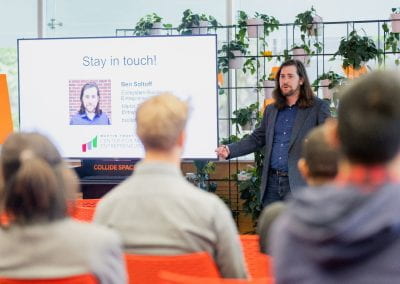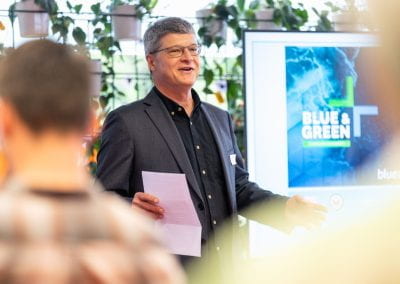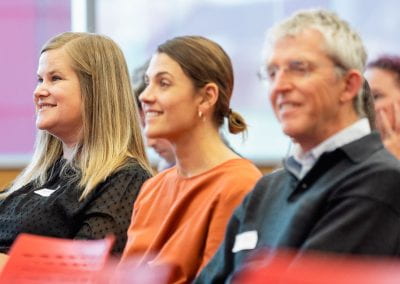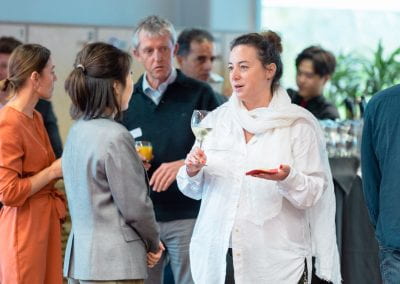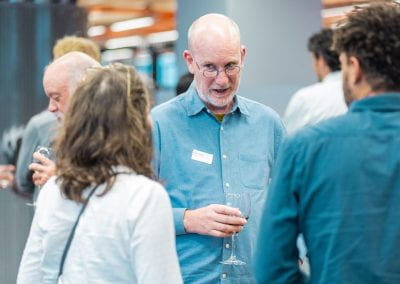
NEWSROOM
The climate tech landscape: what’s real and what’s just hot air?
15 November 2022
Insights into the world of CleanTech entrepreneurship were shared at a recent networking event at the University of Auckland by visiting keynote speaker Ben Soltoff. The event was a collaboration between the Business School’s Centre for Innovation and Entrepreneurship (CIE) and the University’s new flagship research centre Ngā Ara Whetū: Centre for Climate, Biodiversity and Society. In attendance were University students and staff as well as business leaders, entrepreneurs and investors.
Over a wide-ranging talk Soltoff shared thoughts on best practice for approaching venture development as well as data-informed observations on climate tech start-up trends.
Soltoff is a CleanTech expert who has worked with several environmentally relevant start-ups, ranging from a social enterprise in Mexico installing off-grid solar energy, to a hardware company in Silicon Valley building energy-efficient ovens that cook with light. He has worked on international climate policy at World Resources Institute in Washington, DC, as well as at grassroots climate resilience initiatives in rural India. He is currently Entrepreneur in Residence and the Ecosystem-Builder in Residence at the Martin Trust Center at Massachusetts Institute of Technology (MIT) Entrepreneurship.
On the necessity of technological innovation to mitigate climate change
Soltoff presented facts and figures around climate change and commented that though the environmental state of the world may look dire, there is hope with projections that the worst could be prevented with a radical shift in technology, policy, behaviour and other new interventions.
In addressing contributing factors to climate change, Soltoff says “The elephant, or in this case the mammoth in the room, is fossil fuels. Fossil fuels are responsible for the largest share of emissions. However, the good news is that alternatives are emerging, and the cost of renewable energy has been declining steeply.”
“In all the scenarios there’s a major role for technology and innovation. It could be how we implement existing technologies, or it could be innovations in carbon capture or carbon removal. But there’s no way to limit warming without in some way introducing and scaling new technology.”
“If you’re building a new power plant, or new source of power, in most parts of the world, it is cheaper to do renewable energy than to build a new fossil fuel plant over its lifespan. When you think about operating a plant, even then it can be more efficient to build renewable energy. And these costs are continuing to decline.”
On the current state of CleanTech venture investment
According to Price Waterhouse Cooper’s State of Climate Tech report, over US $87 billion was allocated towards venture capital funding for climate tech start-ups between 2020 – 2021. Soltoff discussed how investment has slowed, in line with venture investments across the board. However, there are still deals to be done. “Up until now there’s been a lot of investment in spaces like electric vehicles and batteries, including some of those 100 million US dollar deals. There remains interest among a lot of investors, even if they don’t have as much money for big deals.”
Soltoff also commented that though investment is still a primary pain point for CleanTech innovators, a close second is finding locations to build pilot plants, which need expansive areas for testing and knowledgeable partners who can build large infrastructure. Texas has become a wild west of CleanTech innovation, spurred on by favourable investment and regulatory factors, as well as the presence of established energy companies looking for the next generation of energy solutions.
On being an entrepreneur – It’s more fun to be a pirate than to join the navy
“It’s fun to find opportunity, to seek resources, and build opportunities to take advantage of those of those resources. However, this process of being a pirate also needs some discipline, and we seek to combine the spirit of a pirate with the skills of a Navy SEAL. So yes, it’s more fun to be a pirate. But some of that stuff they teach you in the Navy is also worthwhile.”
Soltoff says at MIT a key scripture is Professor Bill Aulet’s 24 steps to a successful start-up, which emphasises intensive research prior to even thinking of development.
“That is a radical concept for a lot of students at MIT. These are engineers. They like to write code; they like to build product. So to tell them – don’t build anything, stop, pause and go out and talk to a real human being – that is a showstopper. But it’s really important, because you want to make sure you’re building something that folks will actually use. And that has a real heartbeat to it.”
“Since the end of the 20th century, over 30,000 companies have come out of MIT, they’ve created over 4.6 million jobs, and over $2 trillion in revenue. Don’t think that that’s just because, you know, these were the most brilliant people in the room, although they were pretty darn smart. We think that entrepreneurship is a craft that can be taught. And so it’s not an art fully. It’s not a science, it is a skill. It’s like pottery more than anything else. Anyone can do it, and they can do it reasonably well, if they have the training and experience.”
Recommendations from Ben Soltoff:
- Subscribe to the Climate Tech VC newsletter
- Read Bill Aulet’s Disciplined Entrepreneurship: 24 Steps to a Successful Startup or check out the free resources available at d-eship.com
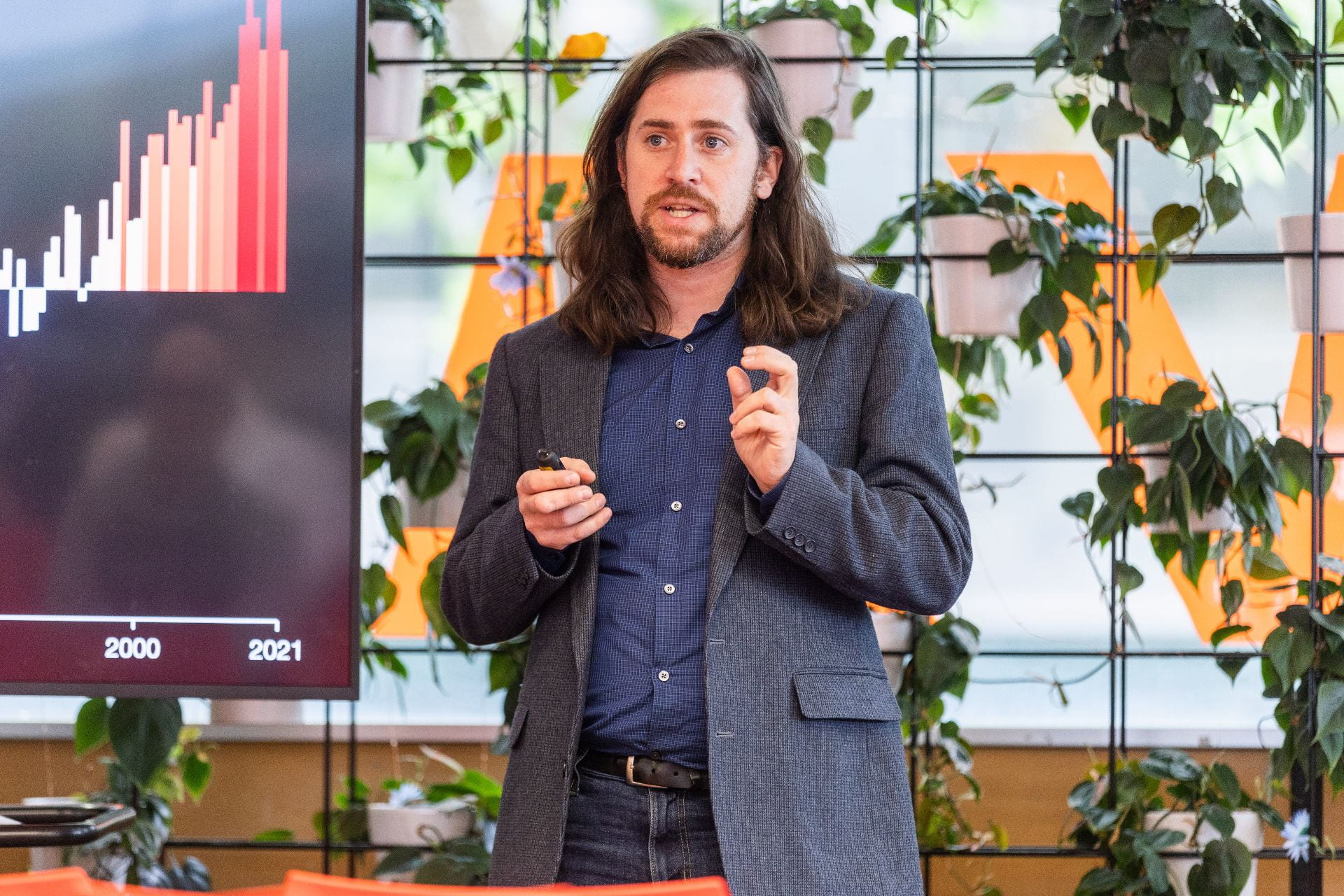

15 November 2022
Insights into the world of CleanTech entrepreneurship were shared at a recent networking event at the University of Auckland by visiting keynote speaker Ben Soltoff. The event was a collaboration between the Business School’s Centre for Innovation and Entrepreneurship (CIE) and the University’s new flagship research centre Ngā Ara Whetū: Centre for Climate, Biodiversity and Society. In attendance were University students and staff as well as business leaders, entrepreneurs and investors.
Over a wide-ranging talk Soltoff shared thoughts on best practice for approaching venture development as well as data-informed observations on climate tech start-up trends.
Soltoff is a CleanTech expert who has worked with several environmentally relevant start-ups, ranging from a social enterprise in Mexico installing off-grid solar energy, to a hardware company in Silicon Valley building energy-efficient ovens that cook with light. He has worked on international climate policy at World Resources Institute in Washington, DC, as well as at grassroots climate resilience initiatives in rural India. He is currently Entrepreneur in Residence and the Ecosystem-Builder in Residence at the Martin Trust Center at Massachusetts Institute of Technology (MIT) Entrepreneurship.
On the necessity of technological innovation to mitigate climate change
Soltoff presented facts and figures around climate change and commented that though the environmental state of the world may look dire, there is hope with projections that the worst could be prevented with a radical shift in technology, policy, behaviour and other new interventions.
In addressing contributing factors to climate change, Soltoff says “The elephant, or in this case the mammoth in the room, is fossil fuels. Fossil fuels are responsible for the largest share of emissions. However, the good news is that alternatives are emerging, and the cost of renewable energy has been declining steeply.”
“In all the scenarios there’s a major role for technology and innovation. It could be how we implement existing technologies, or it could be innovations in carbon capture or carbon removal. But there’s no way to limit warming without in some way introducing and scaling new technology.”
“If you’re building a new power plant, or new source of power, in most parts of the world, it is cheaper to do renewable energy than to build a new fossil fuel plant over its lifespan. When you think about operating a plant, even then it can be more efficient to build renewable energy. And these costs are continuing to decline.”
On the current state of CleanTech venture investment
According to Price Waterhouse Cooper’s State of Climate Tech report, over US $87 billion was allocated towards venture capital funding for climate tech start-ups between 2020 – 2021. Soltoff discussed how investment has slowed, in line with venture investments across the board. However, there are still deals to be done. “Up until now there’s been a lot of investment in spaces like electric vehicles and batteries, including some of those 100 million US dollar deals. There remains interest among a lot of investors, even if they don’t have as much money for big deals.”
Soltoff also commented that though investment is still a primary pain point for CleanTech innovators, a close second is finding locations to build pilot plants, which need expansive areas for testing and knowledgeable partners who can build large infrastructure. Texas has become a wild west of CleanTech innovation, spurred on by favourable investment and regulatory factors, as well as the presence of established energy companies looking for the next generation of energy solutions.
On being an entrepreneur – It’s more fun to be a pirate than to join the navy
“It’s fun to find opportunity, to seek resources, and build opportunities to take advantage of those of those resources. However, this process of being a pirate also needs some discipline, and we seek to combine the spirit of a pirate with the skills of a Navy SEAL. So yes, it’s more fun to be a pirate. But some of that stuff they teach you in the Navy is also worthwhile.”
Soltoff says at MIT a key scripture is Professor Bill Aulet’s 24 steps to a successful start-up, which emphasises intensive research prior to even thinking of development.
“That is a radical concept for a lot of students at MIT. These are engineers. They like to write code; they like to build product. So to tell them – don’t build anything, stop, pause and go out and talk to a real human being – that is a showstopper. But it’s really important, because you want to make sure you’re building something that folks will actually use. And that has a real heartbeat to it.”
“Since the end of the 20th century, over 30,000 companies have come out of MIT, they’ve created over 4.6 million jobs, and over $2 trillion in revenue. Don’t think that that’s just because, you know, these were the most brilliant people in the room, although they were pretty darn smart. We think that entrepreneurship is a craft that can be taught. And so it’s not an art fully. It’s not a science, it is a skill. It’s like pottery more than anything else. Anyone can do it, and they can do it reasonably well, if they have the training and experience.”
Recommendations from Ben Soltoff:
- Subscribe to the Climate Tech VC newsletter
- Read Bill Aulet’s Disciplined Entrepreneurship: 24 Steps to a Successful Startup or check out the free resources available at d-eship.com
EMAIL
CIE@AUCKLAND.AC.NZ
POSTAL ADDRESS
THE UNIVERSITY OF AUCKLAND BUSINESS SCHOOL
PRIVATE BAG 92019, AUCKLAND






